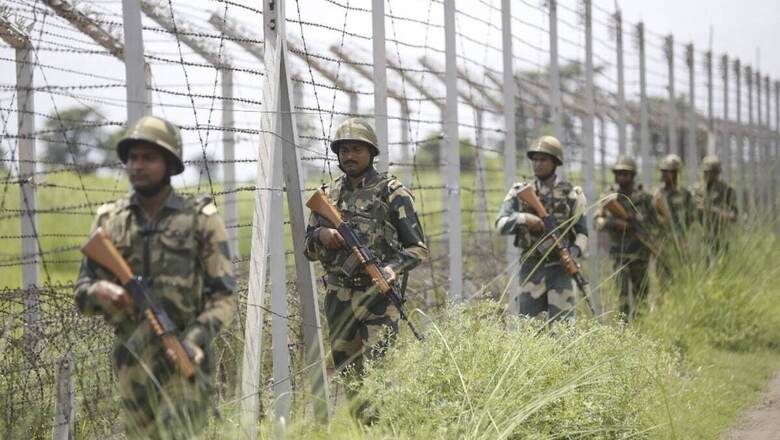
views
The timing of the announcement of the ceasefire on the Line of Control (LoC) in Jammu & Kashmir has caused a lot of speculation about what it signifies. When it comes to Pakistan, sections of Indian opinion who are strong supporters of a dialogue with that country despite its record of hostility towards us have a tendency to over-interpret the significance of any move to reduce tensions.
We should not overlook our past experience with ceasefire “agreements” with Pakistan. Pakistan wants to shield itself against Indian retaliation through a ceasefire agreement while it continues its proxy war in J&K and claim that the violence in Kashmir is homegrown. Which is why India insists on Pakistan verifiably ending its support for terrorism, which means bringing to justice those responsible for the 2008 Mumbai attacks and effectively dealing with jihadi organisations and leaders like Masood Azhar.
No change in fundamental issues
The ceasefire “agreement” of 2003 did not end Pakistan’s support for terrorism in J&K. Pakistan’s terrorist activities, its international propaganda against India continued—the 2008 terrorist mayhem in Mumbai was a searing moment. After the 2016 Uri attack, India carried out the surgical strikes across the LoC. In February 2019, another ceasefire agreement blew up with Pulwama, with the Balakot strike raising the stakes for Pakistan for terrorism directed at India.
Not too much should be read into this agreement in terms of a breakthrough in India-Pakistan ties. For one, this agreement is at the level of DGMOs (Director Generals of Military Operations), not a formally negotiated agreement at the government level. Pakistan would want that and have a mechanism for monitoring the implementation of the agreement and any violation of it, with the involvement of UNMOGIP (United Nations Military Observer Group in India and Pakistan). This would tie India’s hands while Pakistan continues its proxy war. Recent remarks made by the Pakistan Army chief on Kashmir Day have been over-read as a peace signal towards India, overlooking his reference to a solution to the Kashmir issue in accordance with the wishes of the Kashmiris. That during the virtual meeting on Covid-19 convened by Prime Minister Narendra Modi, the Pakistani representative didn’t raise the Kashmir issue is seen as another conciliatory signal. Our own decision to allow Imran Khan’s plane to fly over Laccadives is viewed as pregnant with political meaning. This kind of urge to decipher peace signals from Pakistan conveys an Indian anxiety about reconciliation with Pakistan which is harmful to our diplomacy.
ALSO READ| ‘Pakistan Needs to Create Conditions It Did During Vajpayee-Musharraf Era for Further Talks’: G Parthasarathy
For Pakistan, the Kashmir issue is fundamental to its politics and religious identity; for India, terrorism is the fundamental issue. After the constitutional changes in J&K, the Kashmir issue is no longer on the table. If some back-channel contacts have taken place that led to the DGMOs agreement, not too much should be read into this either. We have diplomatic ties with Pakistan, which means that channels of communication are open. The opening of the Kartarpur corridor, a major political decision, involved high-level political decisions, without ushering in any new phase of reduction of tensions.
What Pakistan is thinking
The view that India has compromised its position on terrorism by the ceasefire agreement is misplaced. Pakistan will not agree to a dialogue without Kashmir on the table. By demanding a restoration of Article 370 as a precondition for a dialogue, Pakistan has boxed itself in and cannot reverse its position without the collapse of its Pakistan policy internally and internationally, entailing high costs for the civilian government and the armed forces. Imran Khan has personally vilified Modi far too much, excessively propagated his Islamic credentials to be seen to be abandoning the Kashmiri cause. If that happened, the terrorists and separatists in Kashmir will be orphaned, and the policy of the Modi government on J&K will have met full success. Mehbooba Mufti’s play about the need for an India-Pakistan dialogue to end the misery of Kashmiris and seeing the ceasefire agreement in that light is the usual separatist politics.
A change of direction on Kashmir by Pakistan has other dimensions. The logic of that would be broader political reconciliation with India, opening of trade and transit, eliminating jihadi elements in Pakistan, a changed policy towards the Taliban and Afghanistan. In other words, an unravelling of Pakistan’s foreign policy as pursued until now. For the moment, Pakistan is grappling with terrorism financing and money laundering and struggling to exit the FATF (Financial Action Task Force) grey list. Its predicament shows both the odium it has earned internationally on the issue of terrorism as well as the difficulty it has to clean up its act internally.
ALSO READ| ‘She Lay Like a Dead Bird’: Why a Family in Uri’s Balakote is Skeptical of India, Pak’s Latest Peace Push
One should therefore look at the ceasefire agreement from a limited perspective. India has been punishing Pakistan for ceasefire violations. In return, our border population has suffered from Pakistani firing. Such firing on both sides doesn’t change the ground position either way but causes casualties on both sides, both civilian and military. There is no strategic gain involved for either side. Despite the agreement, we intend to continue our anti-terrorist operations and retaliate against any Pakistani infraction. Our spokesperson has clarified that our position on key issues has not changed. There was no diplomatic need to specify that terrorism and talks don’t go together as some have observed that would have implied that the ceasefire was intended to prepare the ground for the resumption of talks.
The question of timing
Those who believe that on Pakistan India’s decisions are influenced by the US have raised the bogey of the US having prodded India to reach a ceasefire agreement to obtain Pakistan’s support for facilitating talks with the Taliban and enable the Biden administration to implement its new thinking on Afghanistan. The new US administration is still in the throes of settling down, its priority is not intervention in India-Pakistan matters, especially brokering a ceasefire agreement on the LoC when there is no blow-up there. The thinking behind such commentary is to suggest that the Biden administration has already starting showing its pro-Pakistan inclinations by pressuring India to make a gesture to Pakistan.
India has shown its capacity and grit to stand up to China’s military aggression in Ladakh. China has wilted under India’s robust resistance to its attempt to unilaterally change the Line of Actual Control in its favour and has withdrawn from key contested areas already, with others to follow. The images of Chinese soldiers and tanks retreating to rear bases, dismantling tents and fortifications, will not be lost on our neighbours, especially Pakistan. One can reasonably surmise that Pakistan would have concerns—that with China withdrawing, Indian forces would be freer to pay more attention to the LoC and hit harder at Pakistan for its infractions. For Pakistan to seek a ceasefire agreement seems to be a defensive move. The agreement could not have been announced earlier as China could have misunderstood it as Pakistan aiding India in its confrontation with it by calming one front. That it has been announced in the wake of the India-China disengagement speaks for itself.
Read all the Latest News, Breaking News and Coronavirus News here




















Comments
0 comment